初中语法一般现在时和现在进行时讲解、练习含答案(20200522181304)
- 格式:pdf
- 大小:47.58 KB
- 文档页数:10
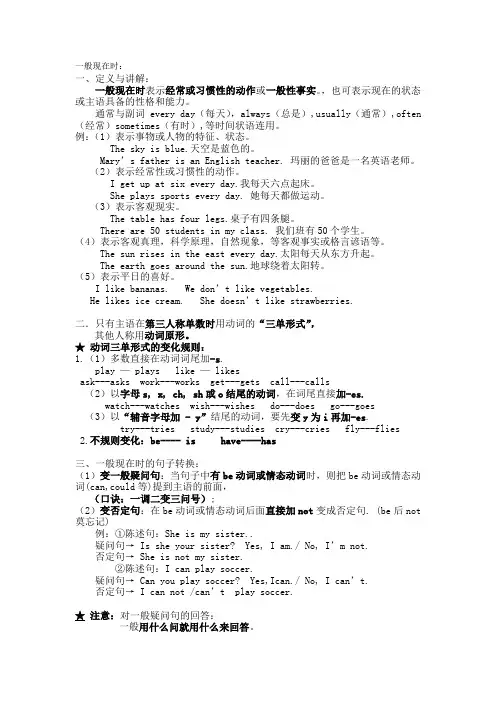
一般现在时:一、定义与讲解:一般现在时表示经常或习惯性的动作或一般性事实。
,也可表示现在的状态或主语具备的性格和能力。
通常与副词every day(每天),always(总是),usually(通常),often (经常)sometimes(有时),等时间状语连用。
例:(1)表示事物或人物的特征、状态。
The sky is blue.天空是蓝色的。
Mary’s father is an English teacher. 玛丽的爸爸是一名英语老师。
(2)表示经常性或习惯性的动作。
I get up at six every day.我每天六点起床。
She plays sports every day. 她每天都做运动。
(3)表示客观现实。
The table has four legs.桌子有四条腿。
There are 50 students in my class. 我们班有50个学生。
(4)表示客观真理,科学原理,自然现象,等客观事实或格言谚语等。
The sun rises in the east every day.太阳每天从东方升起。
The earth goes around the sun.地球绕着太阳转。
(5)表示平日的喜好。
I like bananas. We don’t like vegetables.He likes ice cream. She doesn’t like strawberries.二.只有主语在第三人称单数时用动词的“三单形式”,其他人称用动词原形。
★动词三单形式的变化规则:1.(1)多数直接在动词词尾加-s.play — plays like — likesask---asks work---works get---gets call---calls(2)以字母s, x, ch, sh或o结尾的动词,在词尾直接加-es.watch---watches wish---wishes do---does go---goes (3)以“辅音字母加 - y”结尾的动词,要先变y为i再加-es.try---tries study---studies cry---cries fly---flies2.不规则变化:be---- is have----has三、一般现在时的句子转换:(1)变一般疑问句:当句子中有be动词或情态动词时,则把be动词或情态动词(can,could等)提到主语的前面,(口诀:一调二变三问号);(2)变否定句:在be动词或情态动词后面直接加not变成否定句. (be后not 莫忘记)例:①陈述句:She is my sister..疑问句→ Is she your sister? Yes, I am./ No, I’m not.否定句→ She is not my sister.②陈述句:I can play soccer.疑问句→ Can you play soccer? Yes,Ican./ No, I can’t.否定句→ I can not /can’t play soccer.★注意:对一般疑问句的回答:一般用什么问就用什么来回答。
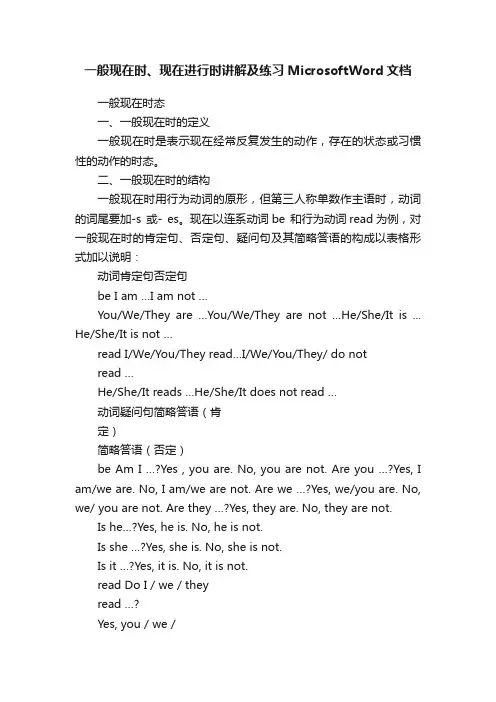
一般现在时、现在进行时讲解及练习MicrosoftWord文档一般现在时态一、一般现在时的定义一般现在时是表示现在经常反复发生的动作,存在的状态或习惯性的动作的时态。
二、一般现在时的结构一般现在时用行为动词的原形,但第三人称单数作主语时,动词的词尾要加-s 或- es。
现在以连系动词be 和行为动词read为例,对一般现在时的肯定句、否定句、疑问句及其简略答语的构成以表格形式加以说明:动词肯定句否定句be I am …I am not …You/We/They are …You/We/They are not …He/She/It is ... He/She/It is not …read I/We/You/They read…I/We/You/They/ do notread …He/She/It reads …He/She/It does not read …动词疑问句简略答语(肯定)简略答语(否定)be Am I …?Yes , you are. No, you are not. Are you …?Yes, I am/we are. No, I am/we are not. Are we …?Yes, we/you are. No, we/ you are not. Are they …?Yes, they are. No, they are not.Is he…?Yes, he is. No, he is not.Is she …?Yes, she is. No, she is not.Is it …?Yes, it is. No, it is not.read Do I / we / theyread …?Yes, you / we /they do.No, you / we / theydo not.Does he / she / itread … ?Yes, he / she / itdoes.No, he / she / it doesnot.连系动词be 的各种形式常与代词或not缩写成一个词。
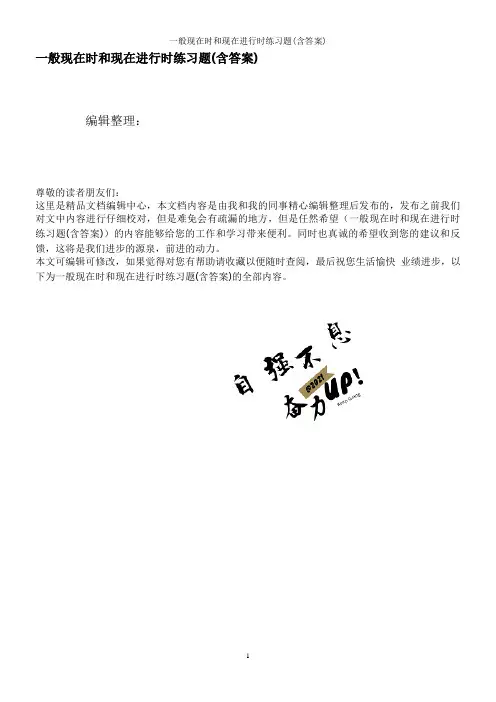
一般现在时和现在进行时练习题(含答案)编辑整理:尊敬的读者朋友们:这里是精品文档编辑中心,本文档内容是由我和我的同事精心编辑整理后发布的,发布之前我们对文中内容进行仔细校对,但是难免会有疏漏的地方,但是任然希望(一般现在时和现在进行时练习题(含答案))的内容能够给您的工作和学习带来便利。
同时也真诚的希望收到您的建议和反馈,这将是我们进步的源泉,前进的动力。
本文可编辑可修改,如果觉得对您有帮助请收藏以便随时查阅,最后祝您生活愉快业绩进步,以下为一般现在时和现在进行时练习题(含答案)的全部内容。
区别一:现在进行时强调目前正在进行的动作,而一般现在时强调经常性或习惯性的动作。
如:I’m reading a story now。
我在看一个故事.(目前正在干的事情)I read stories in my spare time。
我有空时看故事。
(经常性的行为)区别二:现在进行时强调现阶段一直在进行的动作,而一般现在时只表动作的重复,而不表示动作的持续。
如:What are you doing these days? 这几天你在干什么?They are learning English in the summer holiday. 他们暑假在学英语。
They read English every day。
他们每天读英语.They play volleyball every Sunday. 他们每周星期天都打排球。
区别三:某些表示希望或想法的动词(如hope, wonder, want等)的进行时可以表示委婉客气。
如:I’m hoping that you will succeed。
我正在希望你成功呢。
I'm wondering whether you can help us now。
我不知道你现在能否给我们帮一忙。
一般现在时和现在进行时练习题一、选择题练习1. Who _____ over there now?A。
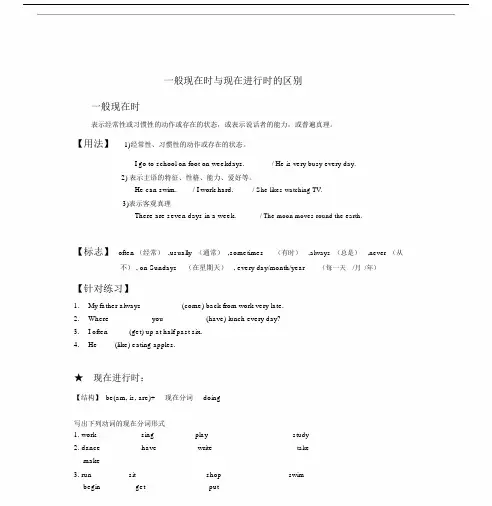
----一般现在时与现在进行时的区别一般现在时表示经常性或习惯性的动作或存在的状态,或表示说话者的能力,或普遍真理。
【用法】1)经常性、习惯性的动作或存在的状态。
I go to school on foot on weekdays./ He is very busy every day.2)表示主语的特征、性格、能力、爱好等。
He can swim./ I work hard./ She likes watching TV.3)表示客观真理There are seven days in a week./ The moon moves round the earth.【标志】often (经常) ,usually (通常) ,sometimes(有时),always(总是),never(从不) , on Sundays(在星期天), every day/month/year(每一天/月/年)【针对练习】1.My father always __________(come) back from work very late.2.Where __________ you __________ (have) lunch every day?3.I often _____(get) up at half past six.4.He ____(like) eating apples.★现在进行时:【结构】 be(am, is, are)+现在分词doing写出下列动词的现在分词形式1. work___________ sing__________ play__________study__________2. dance__________ have__________ write__________take__________make__________3. run_________ sit___________shop__________swim__________begin_________get__________put__________4. lie__________(以ie结尾的动词,把ie 改为y, 再加ing )tie_________【用法】1)表示现在(说话瞬间)正在进行或发生的动作。
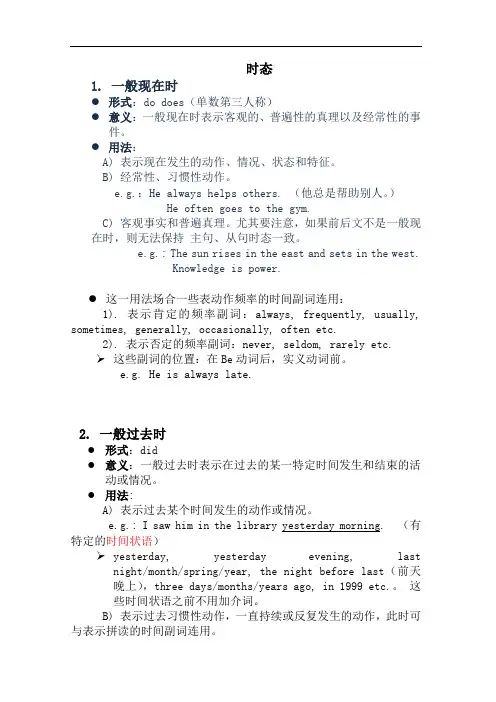
时态1. 一般现在时●形式:do does(单数第三人称)●意义:一般现在时表示客观的、普遍性的真理以及经常性的事件。
●用法:A) 表示现在发生的动作、情况、状态和特征。
B) 经常性、习惯性动作。
e.g.:He always helps others. (他总是帮助别人。
)He often goes to the gym.C) 客观事实和普遍真理。
尤其要注意,如果前后文不是一般现在时,则无法保持主句、从句时态一致。
e.g.: The sun rises in the east and sets in the west.Knowledge is power.●这一用法场合一些表动作频率的时间副词连用:1). 表示肯定的频率副词:always, frequently, usually, sometimes, generally, occasionally, often etc.2). 表示否定的频率副词:never, seldom, rarely etc.➢这些副词的位置:在Be动词后,实义动词前。
e.g. He is always late.2. 一般过去时●形式:did●意义:一般过去时表示在过去的某一特定时间发生和结束的活动或情况。
●用法:A) 表示过去某个时间发生的动作或情况。
e.g.: I saw him in the library yesterday morning. (有特定的时间状语)➢yesterday, yesterday evening, last night/month/spring/year, the night before last(前天晚上),three days/months/years ago, in 1999 etc.。
这些时间状语之前不用加介词。
B) 表示过去习惯性动作,一直持续或反复发生的动作,此时可与表示拼读的时间副词连用。
e.g.: I slept for eight hours last night. (表示在过去某一段时间内持续的动作,但这动作现在已经结束了)3. 一般将来时●形式:will/shall do或be going to do●意义:一般将来时表示在未来的某个时间将要发生的某个动作或状态。
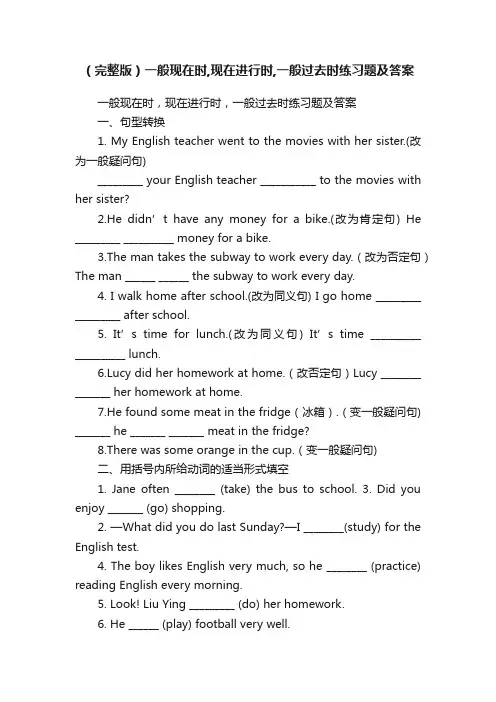
(完整版)一般现在时,现在进行时,一般过去时练习题及答案一般现在时,现在进行时,一般过去时练习题及答案一、句型转换1. My English teacher went to the movies with her sister.(改为一般疑问句)_________ your English teacher ___________ to the movies with her sister?2.He didn’t have any money for a bike.(改为肯定句) He _________ __________ money for a bike.3.The man takes the subway to work every day.(改为否定句)The man ______ ______ the subway to work every day.4. I walk home after school.(改为同义句) I go home _________ _________ after school.5. It’s time for lunch.(改为同义句) It’s time __________ __________ lunch.6.Lucy did her homework at home.(改否定句)Lucy ________ _______ her homework at home.7.He found some meat in the fridge(冰箱).(变一般疑问句) _______ he _______ _______ meat in the fridge?8.There was some orange in the cup.(变一般疑问句)二、用括号内所给动词的适当形式填空1. Jane often ________ (take) the bus to school. 3. Did you enjoy _______ (go) shopping.2. —What did you do last Sunday?—I ________(study) for the English test.4. The boy likes English very much, so he ________ (practice) reading English every morning.5. Look! Liu Ying _________ (do) her homework.6. He ______ (play) football very well.7. Danny ________ (go) to school at 7:10.8. _____your sister_____(know)English? 9.Her home____ _____ ______(远离)her school.10.The pot_____(not look) like your pot very much.11.______she_____(do) the housework every day?12.Jenny and Danny usually______(play) games in the afternoon .13. I _________ (have) an exciting party last weekend.14. _________ she _________(practice) her guitar yesterday? No, she _________.15. What ________ T om ________ (do) on Saturday evening?He ________(watch) TV and __________(read) an interesting book.16. They all _________(go) to the mountains yesterday morning.17. She _________(not visit) her aunt last weekend. She ________ (stay) at home and _________(do) some cleaning.三、选择题1. He is very tired. He doesn’t want to do _______.A.somethingB.nothingC.everythingD.anything2. Everyone ______ here last Monday. A.were B.is C. are D. was3. It’s time ____class. A.for have B. have C. to hav e D. to having4. He helped his mother clean the rooms and then ____ his homework yesterday afternoon.A. doB.doingC. doesD. did5. Jenny ____ in an office. Her parents ____in a hospital.A work; worksB works; workC work; are workingD is working; work6. One of the boys_____ a black hat. A have B there is C there are D has7. Wang Mei ____ music and often ____ to music. A like; listenB likes; listensC like; are listeningD liking listen8. Jenny____ English every evening. A has study B studies C study D studied9.My father______ill yesterday.A.isn't B.aren't C. wasn't D. weren't10.____your parents at home last week﹖A.Is B. Was C. Are D. Were11. your father at work the day yesterday﹖ A. Was; before B. Is; before C. Was; after D. Is; after 12.—Who was on duty last Friday﹖—___. A. I am B. I was C. Yes, I was D. No, I wasn't答案一、1.Did, go 2.had, some 3.doesn’t, take 4.on foot 5.to, have 6. didn’t ,do7.Did,find,any 8.Was there any orange in the cup?二、1.takes 2.studied 3.going 4. practices 5. is doing 6. plays7. goes 8. Does know 9. is away from 10. doesn't look 11. Does, do 12. Play13.had 14.Did,practice,didn’t15.Did,do,watched,read16.went 17.didn’t,visit, s tayed,did三、1-5 D.D.C.D.B 6-10 D.B.B.C.D 11-12.A.B。
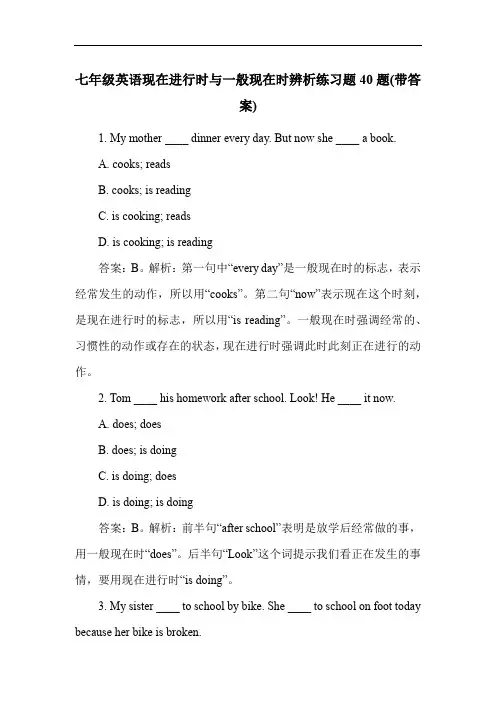
七年级英语现在进行时与一般现在时辨析练习题40题(带答案)1. My mother ____ dinner every day. But now she ____ a book.A. cooks; readsB. cooks; is readingC. is cooking; readsD. is cooking; is reading答案:B。
解析:第一句中“every day”是一般现在时的标志,表示经常发生的动作,所以用“cooks”。
第二句“now”表示现在这个时刻,是现在进行时的标志,所以用“is reading”。
一般现在时强调经常的、习惯性的动作或存在的状态,现在进行时强调此时此刻正在进行的动作。
2. Tom ____ his homework after school. Look! He ____ it now.A. does; doesB. does; is doingC. is doing; doesD. is doing; is doing答案:B。
解析:前半句“after school”表明是放学后经常做的事,用一般现在时“does”。
后半句“Look”这个词提示我们看正在发生的事情,要用现在进行时“is doing”。
3. My sister ____ to school by bike. She ____ to school on foot today because her bike is broken.A. goes; goesB. goes; is goingC. is going; goesD. is going; is going答案:B。
解析:第一句描述的是姐姐通常上学的方式,是一般现在时,所以用“goes”。
第二句“today”这里表示今天这个特殊情况,并且原因是自行车坏了,强调现在正在进行的动作,所以用“is going”。
4. We ____ English classes on Monday. But this Monday we ____ a Chinese test.A. have; haveB. have; are havingC. are having; haveD. are having; are having答案:B。
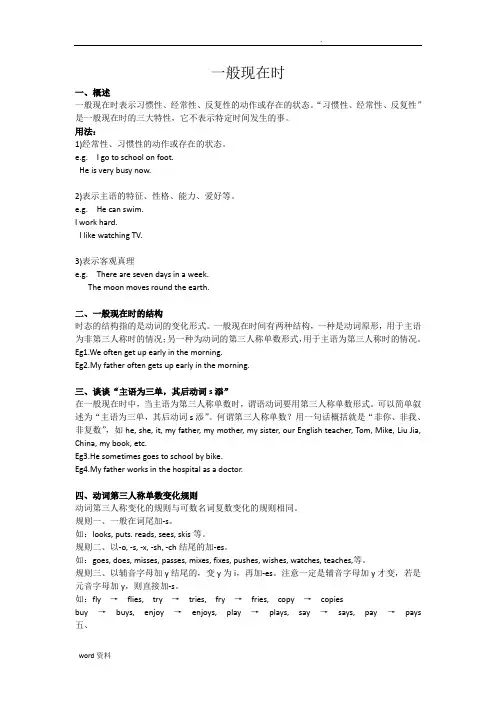
一般现在时一、概述一般现在时表示习惯性、经常性、反复性的动作或存在的状态。
“习惯性、经常性、反复性”是一般现在时的三大特性,它不表示特定时间发生的事。
用法:1)经常性、习惯性的动作或存在的状态。
e.g. I go to school on foot.He is very busy now.2)表示主语的特征、性格、能力、爱好等。
e.g. He can swim.I work hard.I like watching TV.3)表示客观真理e.g. There are seven days in a week.The moon moves round the earth.二、一般现在时的结构时态的结构指的是动词的变化形式。
一般现在时间有两种结构,一种是动词原形,用于主语为非第三人称时的情况;另一种为动词的第三人称单数形式,用于主语为第三人称时的情况。
Eg1.We often get up early in the morning.Eg2.My father often gets up early in the morning.三、谈谈“主语为三单,其后动词s添”在一般现在时中,当主语为第三人称单数时,谓语动词要用第三人称单数形式。
可以简单叙述为“主语为三单,其后动词s添”。
何谓第三人称单数?用一句话概括就是“非你、非我、非复数”,如he, she, it, my father, my mother, my sister, our English teacher, Tom, Mike, Liu Jia, China, my book, etc.Eg3.He sometimes goes to school by bike.Eg4.My father works in the hospital as a doctor.四、动词第三人称单数变化规则动词第三人称变化的规则与可数名词复数变化的规则相同。
规则一、一般在词尾加-s。
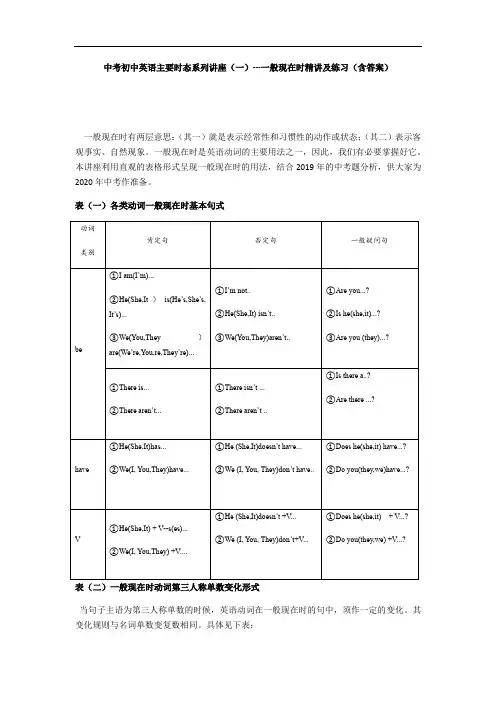
中考初中英语主要时态系列讲座(一)---一般现在时精讲及练习(含答案)一般现在时有两层意思:(其一)就是表示经常性和习惯性的动作或状态;(其二)表示客观事实、自然现象。
一般现在时是英语动词的主要用法之一,因此,我们有必要掌握好它。
本讲座利用直观的表格形式呈现一般现在时的用法,结合2019年的中考题分析,供大家为2020年中考作准备。
表(一)各类动词一般现在时基本句式表(二)一般现在时动词第三人称单数变化形式当句子主语为第三人称单数的时候,英语动词在一般现在时的句中,须作一定的变化。
其变化规则与名词单数变复数相同。
具体见下表:表(三)一般现在时常用时间状语由于一般现在时主要表示经常性或习惯性的动作,所以,在句中就有一些表示性惯性或经常性的副词或短语去说明动作的经常性或习惯性。
现将于一般现在时相关的这些副词或短语,归纳在表中,供大家掌握。
表(四)一般现在时的主要用法【典型考例1】(2019北京)Sam ______with his friends every weekend.A. skatesB. is skatingC. has skatedD. was skating【析】正确答案:A 。
句意是:每个周末,山姆都和朋友们一起滑冰。
根据句末的频度副词短语every weekend(每周末)可知,句子表示的动作具有经常性,所以动词应使用一般现在时。
【典型考例2】(2019青海)----What did you learn in geography yesterday?----I learned that the sun _____ in the east.A.was risingB.risesC.rose【析】正确答案:B。
句意是:昨天的地理课上你学了什么?我学了太阳从东边升起来。
太阳从东边升起来,表示的客观事实,一种自然现象,所以,句中的动词应使用一般现在时,因此,正确答案为B。
【典型考例3】(2019山东临沂)---I'm getting hungry. Do you know where we can get some good food?--- Of course! There ____________ a restaurant around the comer.A. will beB. wasC. is【析】正确答案:C。
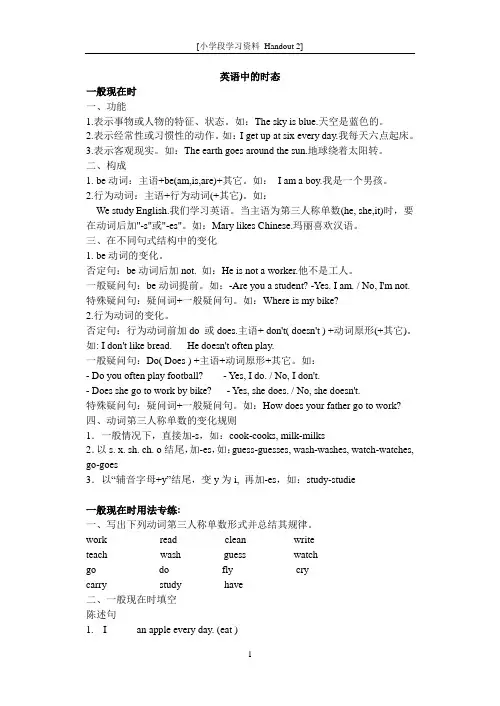
英语中的时态一般现在时一、功能1.表示事物或人物的特征、状态。
如:The sky is blue.天空是蓝色的。
2.表示经常性或习惯性的动作。
如:I get up at six every day.我每天六点起床。
3.表示客观现实。
如:The earth goes around the sun.地球绕着太阳转。
二、构成1. be动词:主语+be(am,is,are)+其它。
如:I am a boy.我是一个男孩。
2.行为动词:主语+行为动词(+其它)。
如:We study English.我们学习英语。
当主语为第三人称单数(he, she,it)时,要在动词后加"-s"或"-es"。
如:Mary likes Chinese.玛丽喜欢汉语。
三、在不同句式结构中的变化1. be动词的变化。
否定句:be动词后加not. 如:He is not a worker.他不是工人。
一般疑问句:be动词提前。
如:-Are you a student? -Yes. I am. / No, I'm not. 特殊疑问句:疑问词+一般疑问句。
如:Where is my bike?2.行为动词的变化。
否定句:行为动词前加do 或does.主语+ don't( doesn't ) +动词原形(+其它)。
如: I don't like bread. He doesn't often play.一般疑问句:Do( Does ) +主语+动词原形+其它。
如:- Do you often play football?- Yes, I do. / No, I don't.- Does she go to work by bike?- Yes, she does. / No, she doesn't.特殊疑问句:疑问词+一般疑问句。
如:How does your father go to work? 四、动词第三人称单数的变化规则1.一般情况下,直接加-s,如:cook-cooks, milk-milks2.以s. x. sh. ch. o结尾,加-es,如:guess-guesses, wash-washes, watch-watches, go-goes3.以“辅音字母+y”结尾,变y为i, 再加-es,如:study-studie一般现在时用法专练:一、写出下列动词第三人称单数形式并总结其规律。
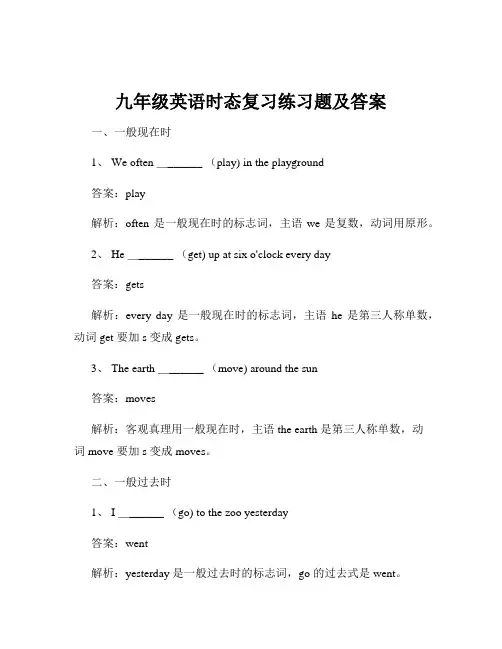
九年级英语时态复习练习题及答案一、一般现在时1、 We often _______ (play) in the playground答案:play解析:often 是一般现在时的标志词,主语 we 是复数,动词用原形。
2、 He _______ (get) up at six o'clock every day答案:gets解析:every day 是一般现在时的标志词,主语he 是第三人称单数,动词 get 要加 s 变成 gets。
3、 The earth _______ (move) around the sun答案:moves解析:客观真理用一般现在时,主语 the earth 是第三人称单数,动词 move 要加 s 变成 moves。
二、一般过去时1、 I _______ (go) to the zoo yesterday答案:went解析:yesterday 是一般过去时的标志词,go 的过去式是 went。
2、 She _______ (be) happy last week答案:was解析:last week 是一般过去时的标志词,主语 she 是第三人称单数,be 动词用 was。
3、 They _______ (not do) their homework last night答案:didn't do解析:last night 是一般过去时的标志词,否定句要用助动词didn't,后面接动词原形 do。
三、一般将来时1、 We _______ (have) a party next week答案:will have / are going to have解析:next week 是一般将来时的标志词,可以用 will +动词原形或者 be going to +动词原形的结构。
2、 He _______ (come) back tomorrow答案:will come / is going to come解析:tomorrow 是一般将来时的标志词,同理可用 will +动词原形或者 be going to +动词原形。
(word完整版)初⼀现在进⾏时讲解练习及答案.doc中考总复习之⼀般现在进⾏时⼀. 1.现在进⾏时的构成: Am/is/ are+ v-ing 是现在进⾏时的构成形式v-ing 现在分词的构成:⼀般情况+ing falling以不发⾳字母 e 结尾去e, +ing having的单词以重读闭⾳节结尾的单双写词尾字母putting词,末尾只有⼀个辅⾳字+ing母时 .2.否定 be not3.⼀般疑问句把 be 动词前提 . Are you watching TV?4. 特殊疑问句在⼀般疑问句前加上特殊疑问词。
E.g. what are you doing?⼆.现在进⾏时的基本⽤法1表⽰说话时正在进⾏的动作常和 now 连⽤,有时⽤⼀个动词如look (看)、listen(听)来表⽰now(现在)这⼀时间概念。
Look !A train is coming.Listen! He is playing the piano.2表⽰现阶段正在进⾏着的动作但不⼀定是说话时正在进⾏。
常和at present(⽬前)、this week(本周)、these days(这⼏天)等时间状语连⽤。
What lesson are you studying this week?(说话时并不在学)3现在进⾏时有时可⽤来表⽰⼀个在最近按计划或安排要进⾏的动作即是说可以⽤来代替将来时,但此时,⼀般要与表⽰将来的时间状语连⽤,⽽且仅限于少量动词。
如: go(去)、come(来)、leave(离开)、start (开始)、arrive(到达)、return(返回)、sleep(睡觉)、Are you going to Tianjing tomorrow ?How many of you are Coming to the party next week?4be going to+动词原形这⼀句型表⽰即将发⽣的事或打算(准备)做的事,我们把它归在将来时⾥了。
现在进行时(一)现在进行时的构成肯定句:主语+be(am ,is, are)+Ving(现在分词)+其他成分注:现在分词的构成否定句: + + + +I ________ __________ a student.(我不是学生。
一般疑问句:+ + + ?_________ _________ a student?肯定回答:Yes, 主语+ be(am ,is, are)否定回答:No,主语+ be(am ,is, are)+not. 特殊疑问句:特殊疑问词+ be(am ,is, are)+主语+Ving(现在分词)+其他成分?(二)不用于现在进行时的动词:1)表示事实状态的动词,如have, belong, possess, cost, owe, exist, include, contain, matter, weigh, measure, continue等。
I have two brothers. 我有两兄弟。
This house belongs to my sister. 这房子是我姐的。
2)表示心理状态的动词,如know, realize, think see, believe, suppose, imagine, agree, recognize, remember, want, need, forget, prefer, mean, understand, love, hate等。
I need your help. 我需要你的帮助。
He loves her very much. 他爱她很深。
3)瞬间动词,如accept, receive, complete, finish, give, allow, decide, refuse等。
I accept your advice. 我接受你的劝告。
4)系动词,如seem, remain, lie, see, hear, smell, feel, taste, get, become, turn等。
一般现在时和现在进行时一般现在时用法:1.现阶段经常性习惯性动作或存在的状态I leave home for school at 7 every morning.2.客观真理 , 客观存在,科学事实The earth moves around the sun.Shanghai lies in the east of China.3.在格言或警句中Pride goes before a fall. 骄者必败。
常用时间状语: sometimes, often, every day, usually, always等构成: 1.动词用原形I like it.2.当主语是第三人称单数时,动词要加-s(-es) She likes it.3.be 动词用am,is, areI am a teacher.He is a boy.They are girls.否定形式: 1.don ’动t+词原形I don ’t like it.They don ’t like it.2.当主语是第三人称单数时,则为doesn’动t+词原形He doesn ’ t like it. 一般疑问句:把do 或does 放在主语的前面,后面动词用原形Do you like it? Does Ann like it?注意:动词三单的变化规则【巩固练习】写出下列动词的第三人称单数drink ________ stay ________ look _________ have_______ do_________pass_______ carry ________ come________ watch______ brush________1. Mrs. Smith _____ the windows every day.A. is cleaningB. cleanC. cleans2. On Sunday he sometimes _____ his clothes and sometimes _____ some shopping.A. wash/ doB. is washing/ is doingC. washes/ does3. She _____ up at six in the morning. A. get B. gets C. getting现在进行时1.定:表示正在生或行的作构: be (am, is, are)+在分形式(写:be+-ing)A、述句 (肯定句 )主+ be(am, is, are)+在分,如:I am reading English.我正在英。
七年级英语现在进行时与一般现在时辨析练习题40题含答案解析1.Look! The boys ______ football in the playground.A.playB.playsC.are playingD.is playing答案解析:C。
A 选项play 是一般现在时;B 选项plays 也是一般现在时且主语是第三人称单数;C 选项are playing 是现在进行时,主语是boys 复数形式;D 选项is playing 是现在进行时但主语是第三人称单数。
题干中Look!表明正在发生的动作,所以用现在进行时,boys 是复数,所以用are playing。
2.My mother usually ______ breakfast at seven in the morning.A.makeB.makesC.is makingD.are making答案解析:B。
A 选项make 是一般现在时原形;B 选项makes 是一般现在时第三人称单数形式;C 选项is making 是现在进行时;D 选项are making 是现在进行时且主语是复数。
usually 表明是通常的动作,用一般现在时,mother 是第三人称单数,所以用makes。
3.Listen! Someone ______ in the next room.A.singB.singsC.is singingD.are singing答案解析:C。
A 选项sing 是一般现在时原形;B 选项sings 是一般现在时第三人称单数形式;C 选项is singing 是现在进行时,主语是someone 单数形式;D 选项are singing 是现在进行时且主语是复数。
Listen!表明正在发生的动作,所以用现在进行时,someone 是单数,所以用is singing。
4.We ______ English class every day.A.haveB.hasC.are havingD.is having答案解析:A。
现在进行时(一)现在进行时的构成肯定句:主语+be(am ,is, are)+Ving(现在分词)+其他成分注:现在分词的构成否定句: + + + +I ________ __________ a student.(我不是学生。
一般疑问句:+++ ?_________ _________ a student?肯定回答:Yes, 主语+ be(am ,is, are)否定回答:No,主语+ be(am ,is, are)+not. 特殊疑问句:特殊疑问词+ be(am ,is, are)+主语+Ving(现在分词)+其他成分?(二)不用于现在进行时的动词:1)表示事实状态的动词,如have, belong, possess, cost, owe, exist, include, contain, matter, weigh, measure, continue等。
I have two brothers. 我有两兄弟。
This house belongs to my sister. 这房子是我姐的。
2)表示心理状态的动词,如know, realize, think see, believe, suppose, imagine, agree, recognize, remember, want, need, forget, prefer, mean, understand, love, hate等。
I need your help. 我需要你的帮助。
He loves her very much. 他爱她很深。
3)瞬间动词,如accept, receive, complete, finish, give, allow, decide, refuse等。
I accept your advice. 我接受你的劝告。
4)系动词,如seem, remain, lie, see, hear, smell, feel, taste, get, become, turn等。
一般现在时(1)表示经常或习惯性的动作。
⑵常与频率副词:never从来不seldom极少sometimes有时often经常usually 常常always 总是或every day 每天、in the morning / afternoon / evening 在早上/下午/晚上等连用。
(3)结构:①be型主语+be动词+其他。
表示主语的个性、特征或状态。
a.肯定句中,只出现be,如:I am a student.我是一名学生。
b・否定句中,要在be后面加not,如:She isn't a teacher.她不是教师。
c.一般疑问句,要将be放在句子开头(注意句首字母大写),句尾用问号,答语用Yes,主语+be.或No,主语+be+not.如:一Are you ready?一你准备好了吗?一Yes, I am.一是的,我准备好了。
(一No, Pm not.一不,我没准备好。
)②实义动词型主语+动词原形/动词第三人称单数s/es+其他。
表示经常性或习惯性的动作。
a.肯定句中,只出现实义动词,女口:I get up in the morning.我早晨起床。
b.否定句屮,在实义动词前而加do(does)+not, do(does)作助动词,本身无意义, 常与not 缩写成don'tCdoesn't),如:I don't like vegetables.我不喜欢蔬菜。
c.一般疑问句,要在句子开头加助动词Do(does),句尾用问号,简略答语用Yes,主语+do(does).或No,主语+do(does)+not.女口:一Do you like oranges?一你喜欢桔了吗?—Yes, Ido.—是的,我喜欢。
(—No, I don't.—不,我不喜欢。
(5) 一般现在时用行为动词的原形,但第三人称单数作主语时,动词耍用第三人称单数形式。
三单变化:①多数在动词后+s play 一plays like 一likesask■一asks work■一works get■一gets stay—stays②以字母s, x, ch, sh或o结尾的动词,在词尾直接加-es. watch-一watcheswish―wishes fix■一fixes do-一does go-一goes pass―passes③以“辅咅字母加・y”结尾的动词,要先变y为i再加-es. try—tries study■一studies cry—cries fly■一flies④不规则变化:be——is are have——has练习1.We often _____ (play) in the playground.2.He _____ (get) up at six o'clock.3. ____ you ______ (brush) your teeth every morning.4.What (do) ______ he usually (do) ______ after school?5.Danny _____ (study) English, Chinese, Maths, Science and Art at school.6.Mike sometimes ________ (go) to the park with his siste匚7.At eight at night, she __________ (watch) TV with his parents.8. _______ Mike ________ (read) English every day?9.How many lessons _________ your classmate ________ (have) on Monday?10.What time ________ his mother _________ (do) the housework?I.Do you often play football after school?(肯定回答)2.1have many books.(改为否定句)3.Gao Shan's sister likes playing table tennis (改为否定句)4.She lives in a small town near New York.(改为一般疑问彳U)5.1watch TV every day.(改为一般疑问句)6.David has got a goal.(改为一般疑问句)7.We have four lessons.(否定句)& Nancy doesn't run fast (肯定句)9.My dog runs fast.否定句:一般疑问句:10.Mike has two letters for him. 一般疑问句:否定句:II. 1 usually play football on Friday afternoon.否定句:一般疑问句:划线提问12.Su Yang usually washes some clothes on Saturday.否定句:一般疑问句:划线捉问:13.Mingming usually waters the flowers every day 否定句:般疑问句:划线提问14.Tom does his homework at home.否定句:一般疑问句:划线提问一般过去时(1)一般过去时表示在过去某个时间发生的动作或存在的状态.(2)常'和yesterday, last night/year, two days/weeks ago, just now. a moment ago, in 1990/2006等表示过去的时间状语连用。
一般现在时:一、定义与讲解:一般现在时表示经常或习惯性的动作或一般性事实。
,也可表示现在的状态或主语具备的性格和能力。
通常与副词every day(每天),always(总是),usually(通常),often(经常)sometimes(有时),等时间状语连用。
例:(1)表示事物或人物的特征、状态。
The sky is blue.天空是蓝色的。
Mary’s father is an English teacher. 玛丽的爸爸是一名英语老师。
(2)表示经常性或习惯性的动作。
I get up at six every day.我每天六点起床。
She plays sports every day. 她每天都做运动。
(3)表示客观现实。
The table has four legs.桌子有四条腿。
There are 50 students in my class. 我们班有50个学生。
(4)表示客观真理,科学原理,自然现象,等客观事实或格言谚语等。
The sun rises in the east every day.太阳每天从东方升起。
The earth goes around the sun.地球绕着太阳转。
(5)表示平日的喜好。
I like bananas. We don’t like vegetables.He likes ice cream. She doesn’t like strawberries.二.只有主语在第三人称单数时用动词的“三单形式”,其他人称用动词原形。
★动词三单形式的变化规则:1.(1)多数直接在动词词尾加-s.play — plays like — likesask---asks work---works get---gets call---calls(2)以字母s, x, ch, sh或o结尾的动词,在词尾直接加-es.watch---watches wish---wishes do---does go---goes(3)以“辅音字母加 - y”结尾的动词,要先变y为i再加-es.try---tries study---studies cry---cries fly---flies2.不规则变化:be---- is have----has三、一般现在时的句子转换:(1)变一般疑问句:当句子中有be动词或情态动词时,则把be动词或情态动词(can,could等)提到主语的前面,(口诀:一调二变三问号);(2)变否定句:在be动词或情态动词后面直接加not变成否定句. (be后not莫忘记) 例:①陈述句:She is my sister..疑问句→ Is she your sister? Yes, I am./ No, I’m not.否定句→ She is not my sister.②陈述句:I can play soccer.疑问句→ Can you play soccer? Yes,Ican./ No, I can’t.否定句→ I can not /can’t play soccer.★注意:对一般疑问句的回答:一般用什么问就用什么来回答。
但以下例外:Is this a pencil? Yes , it is./ No, it isn’t.Is that your backpack? Yes , it is./ No, it isn’t.Are these your parents? Yes, they’re./ No, they aren’t.Are those Jim’s brothers? Yes, they’re./ No, they aren’t.(3)当句子中没有be动词,也没有情态动词时,变一般疑问句时,在主语前加助动词do (I, we, you,以及复数), does(第三人称单数she,he,it等)变成问句;(4)变否定句时,在主语后谓语动词前加助动词don’t, doesn’t变成否定句,切记:助动词后的动词则还原成动词原形。
例:①陈述句:We get up(起床) at 7:00 every morning.疑问句→Do you get up at 7:00 every morning?否定句→We don’t get up at 7:00 every morning.②陈述句:She has a brother.疑问句→ Does she have a brother?否定句→ She doesn’t have a brother.※在一般现在时中,当主语是第三人称单数时,谓语动词要用第三人称单数形式,即常在动词原形后加-s或-es。
但有些同学们对于哪些主语是第三人称单数还不十分清楚,现归纳总结如下:一、人称代词he, she, it是第三人称单数。
如:He likes watching TV. 他喜欢看电视。
She has lunch at twelve. 她十二点吃午餐。
二、单个人名、地名或称呼作主语;是第三人称单数。
如:①Han Mei likes salsd . 韩梅喜欢萨拉。
②Beijing is in China. 北京在中国。
③Uncle Wang often plays volleyball.. 王叔叔经常打排球。
三、单数可数名词或"this / that / the+单数可数名词"作主语时,是第三人称单数。
如:②This book is yours. 这本书是你的。
③That car is red. ④The cat is Lucy's. 这只猫是露茜的。
四、不定代词someone, somebody, nobody, everything, something等及指示代词this, that作主语时,是第三人称单数。
①Everyone is here. 大家到齐了。
②There is a watch on the table. 桌上有块手表。
③This is a pen. 这是一支钢笔。
④That is an eraser.五、不可数名词作主语时为第三人称单数。
如:①The milk(牛奶) is in the glass. 牛奶在玻璃杯里。
②The bread is very small. 那面包很小。
六、当数字或字母作主语时,看作第三人称单数。
如:①"6" is a lucky number. "6"是个吉利数字。
②"I" is a letter. "I"是个字母。
一、按照要求改写句子1.This is my pencil ? (变一般疑问句) your pencil ?(变一般疑问句)2. These red socks are Kate’s .socks Kate’s ?3. Mary does not have any books . (变肯定句) some books .4. She likes the black bag very much . (变为否定句)5. I like apples. (用she改写句子)an English dictionary . (对画线部分提问)6. It’s.7. He has hamburger and apples for dinner . (变一般疑问句)二、用Be动词填空。
1. you Li Fen ? No, not .2. Mr. green very busy? Yes , he .3..This book very interesting .4. What class you in ?5. You and I good friends .6. The basketball club fun .三.用所给动词的适当形式填空。
1. Lin Tao (like) his ruler .2. Let’s(have) ice cream .3. Let’s(play) tennis !4. He (like) English.5. Nice (meet) you !6. I (need) some fruits.一般现在时用法专练:一、写出下列动词的第三人称单数形式。
have like drink _____ go _____ stay ____ study___ _ teach_____make ______look ______have____ come_____ watch______ plant_____ fly _____ do_____二、用括号内动词的适当形式填空。
1. He often ________(have) dinner at home.2. Daniel and Tommy _______(be) in Class One.3. We_______(not watch) TV on Monday.4. Nick ____ ___(not go) to the zoo on Sunday.5. ______ they ________(like) pears?6. _______ your parents _______(have) eggs every day?7. There ________(be) some water in the bottle.18. Mike _______(like) cooking.9. They _______(have) the same hobby.10. Liu Tao ______ _(do) not like PE.11. This boy often _______(watch) TV in the evening.五、改错(划出错误的地方,将正确的写在横线上)1. Is your brother speak English? __________________2. Does he likes going fishing? ________________3. He likes play games after class. _______________ __4. Mr. Wu teachs us English. _________________5. She don’t do her homework on Sundays. ___________一般现在时态句型转换1.This is a white key. (对画线部分进行提问)2.Ben’s bag is yellow and red . (对画线部分进行提问)3.Her name is Gina. (对画线部分进行提问)4.My phone number is 673-8220. (对画线部分进行提问)5.The boy’s name is Jack. (对画线部分进行提问)6.The picture is on the wall. (对画线部分进行提问)7.Your baseball is under the chair. (对画线部分进行提问)8.His book is on the desk. (对画线部分进行提问)9.Some balls are in the dresser. (对画线部分进行提问)10.My computer is on my desk. (对画线部分进行提问)11.He is Johnny. (改为一般疑问句)12.These are his parents. (改为一般疑问句)13.This is my sister. (改为一般疑问句)14.The baseball is under the bed. (改为一般疑问句)15.My key is on the bed. (改为一般疑问句)16.He has a tennis racket. (改为一般疑问句)17.I have some baseball bats. (改为一般疑问句)18.She has many things to do today. (改为一般疑问句)19.I like hamburgers . (改为一般疑问句)20.They have a TV. (改为一般疑问句)25.You are Tina. (改为否定句)26.These are my brothers. (改为否定句)27.The books are on the bookcase. (改为否定句)28.Three books are under the desk. (改为否定句)29.She has a computer game. (改为否定句)30.We have a big TV in our house. (改为否定句)31.Kate has some money in her pocket. (改为否定句)32.He likes ice cream. (改为否定句)34.Nice to meet you! (写出答语)35.Is that a dictionary ?(改为复数句)____________________________________________36These are photos. (改为单数句)37.Is he your cousin? (作肯定回答)38.Is Linda his sister? (作否定回答)39.Is this a Chinese book? (作否定回答)40.Those are dictionaries. (改为单数句)41.Is the CD on the sofa?( 作肯定回答)42.Are the chairs next to the table ?(作否定回答)43.Where is my book ?(改为复数句子)44.They are on the sofa .( 改为单数句子)现在进行时现在进行时是由“助动词be(am, is, are)+动词-ing”构成,表示说话者“此刻”或现阶段的行为。